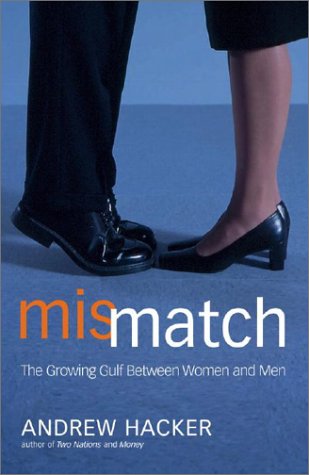To judge from its title, we could reasonably expect this book to be about the growing gulf between women and men. Yet Andrew Hacker, a professor of political science at Queens College, spends much of the book reciting differences between the sexes that have always existed. With cumbersome detail (as if imparting new and fresh information), Hacker describes the varying emotional makeups of men and women; their difference in sex drives; the male tendency to commit rape, which females do not exhibit; and the female proclivity to stay home to rear children. How enlightening.
Though he never once uses the word feminist, feminism is the worldview Hacker largely presents. (The SAT is biased against girls; women have to fight the Old Boys’ Club in their careers.) Cartoon-ishly, he presents liberals as freedom-loving skeptics of big business and conservatives as gun-toting morality censors. In his world, women are Democrats, and men are Republicans. Hacker states that a natural affinity between the sexes has merely been assumed and that women have generally paid an unpleasant price:
The burden usually fell on the woman to make the pairing work. . . . It was the woman’s job to listen and understand; to sympathize when he suffered setbacks, to cheer his minor triumphs . . . If he asked about her day, his questions were usually perfunctory; nor was it always evident that he was absorbing her answers.
Hacker points to one aspect that has been changing over the past decades: More and more women have been entering the workforce as equal partners of men. And a big reason for today’s divorce rates, Hacker believes, is that fewer women display “the readiness . . . to subsume themselves or limit their ambitions to make life more congenial for men.” Because society now offers career and lifestyle options that women did not enjoy before, “it is becoming increasingly difficult to describe today’s women and men as a natural match.” The reason for this disparity, Hacker argues, is not so much the newfound freedoms of women, which he applauds, but that women “are finding that all too many men lack the qualities they desire” and that “only rarely do men show themselves disposed to change in more than marginal ways.”
He also argues that men feel their masculinity threatened by successful women who “expect full equality, not just legally and in the economic arena, but in the holistic sense of being perceived as an integral human being.” Some men have admitted in surveys that their image of manhood is shaken when their wives make more money than they do. Others continue to believe that a woman’s place is, indeed, in the home. The problem with Mismatch, however, is that its thesis—rising divorce is the result of today’s women not putting up with boorish men—is not what the book is actually about. Since Hacker’s claim remains largely unsubstantiated by the information he provides, it is hard to tell just what the book is about.
Ostensibly in an effort to be comprehensive, Hacker forces page after tedious page of minutiae on his readers—SAT scores, boys’ knack for math, girls’ knack for literature, male majors, female majors; he tosses around so many percentages and numbers in almost every paragraph as to make every woman’s, and at least some men’s, head spin; he includes charts and more charts, even two sample SAT questions. All this to make the point that more women than men are getting bachelor’s degrees and that “another mismatch is in the making, as fewer men share the education and interests that are accruing to women.”
Hacker then goes on to discuss just about anything that seems to pop into his mind: the existence of rape (no evidence of whether the incidence of this crime is rising or not); basketball and hip-hop music (their popularity among white teenage boys is great); race (there has been an increase in the number of interracial couples); homosexuality (the number of openly homosexual men has risen since the 1970’s); the death penalty (Hacker believes it to be racist). One wonders why he did not throw in his favorite pasta recipe, too.
Turning to one of his favorite subjects—white men’s alleged fear of blacks’ superior sexual virility—he writes that,
In earlier times, white men responded to these fears with periodic lynchings . . . Today, the surrogate for lynching is imprisonment. As of this writing, almost a million black men languish in the nation’s prisons, comprising more than half of the inmate population. To be sure, each one is there for having violated a law. Yet when the racial ratio rises that high, it makes sense to consider whether black men are also being locked in cages to suppress a sexual threat.
For heaven’s sake, did the folks at Scrib-ner not provide this man with an editor?
Mismatch is essentially a hodge-podge of the most vapid cliches that pass for deep thinking on Hacker’s part. Billed by Hacker as “intended for an intelligent audience interested in a serious subject,” this book is an insult to any such person.
[Mismatch: The Growing Gulf Between Women and Men, by Andrew Hacker (New York: Scribner) 228 pp., $25.00]

Leave a Reply